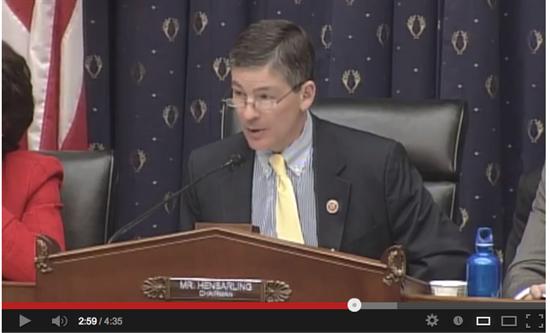Chairman Hensarling Opening Statement at FY14 Budget Views and Estimates Markup"We cannot have a healthy economy until we have a budget that puts our nation on a sustainable path."
Washington,
February 26, 2013
House Financial Services Committee Chairman Jeb Hensarling (R-TX) delivered the following opening statement at today’s full committee markup of the Views and Estimates of the Fiscal Year 2014 budget.
House Financial Services Committee Chairman Jeb Hensarling (R-TX) delivered the following opening statement at today’s full committee markup of the Views and Estimates of the Fiscal Year 2014 budget. "We cannot have a healthy economy until we have
a budget that puts our nation on a sustainable path." "Regrettably, the president has once again chosen not to submit his budget by the statutory deadline of the first Monday in February. Nonetheless, the Financial Services Committee has received instructions from the Budget Committee as of February 8th to proceed with the submission of its views and estimates by March 1st. Thus this markup today, so that at least the House can keep to its statuary deadline, notwithstanding the fact that the president has chosen to be late every single year, but that is a far better record than the United States Senate which contrary to law has failed – failed – to submit a budget in the last four years. But I suppose if you believe in no limitations on spending, or no limitations on debt, perhaps then you feel no onus to produce a budget at all. "We believe that hardworking families and hardworking taxpayers deserve better. We cannot have a healthy economy until we have a budget that puts our nation on a sustainable path. Though I know we differ on solutions, I hope we can all agree that the screens to the left and the screens to the right, showing the current national debt is a great challenge facing our nation. Many of us, too, believe this is the great existential threat to a healthy economy, not to mention the future of our children. "Now for many who continue to offer the opinion that Washington does not have a spending problem, I would hope they would look carefully at the views and estimates and perhaps reconsider that opinion. Many of us do not believe that it is a revenue problem, and in fact, and according to the Congressional Budget Office, the federal government will take in more revenues this year than ever before, $ 2.7 trillion. Yet despite all of this new revenue flowing into the system, our publicly held debt continues to rise far higher than what we have seen in the past. And as we all know, we’ve had more national debt accumulated in the last four years than in the first 200 of our Republic’s existence. "Spending has traditionally been at roughly 20 percent of our economy, revenues at about 18½ , and yet now what we see is spending at approximately 24 percent of GDP on its way to 40 over the course of the next generation, which will force crushing tax burdens upon working families – and exactly the middle income families the president says his policies are designed to help. We don’t know when a debt crisis will occur. But if we do not change the fiscal trajectory that we are on, we know that it will occur. "According to the Congressional Budget Office, when it happens investors could lose confidence in government’s ability to manage its budget. This means the government would lose its ability to borrow at affordable rates and the resulting spike in interest rates could choke off economic activity. And, in fact, according to the Obama Administration every one percentage loss of GDP is one million jobs. Our fellow countrymen without jobs. "Again, the debt crisis is spending driven. It is the great existential crisis of our time. It’s not just the math; look into the faces of our children and grandchildren and know that this is also a moral question. We must put America on a fiscally-sustainable trajectory. Our committee will do its part, and thus these views and estimates are presented and I urge their adoption." ### |


